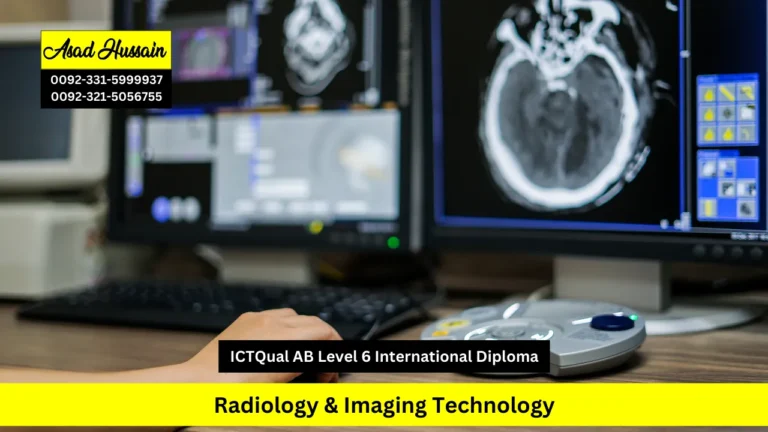In today’s world, electrical engineering plays a critical role in shaping technological advancements. With industries rapidly evolving, skilled professionals are needed to meet the demands of an increasingly complex electrical landscape. For those aspiring to gain expertise in this field, the ICTQual Level 6 Diploma in Electrical Engineering provides a comprehensive pathway to acquiring advanced skills, knowledge, and practical experience. This three-year, 360-credit program is an ideal choice for individuals looking to make significant strides in their careers and contribute meaningfully to the electrical engineering sector.
The ICTQual Level 6 Diploma in Electrical Engineering is a highly specialized qualification that offers a deep dive into the essential principles, technologies, and applications of electrical engineering. Designed for those looking to progress from basic electrical knowledge to an advanced professional level, this diploma equips students with the necessary tools to tackle real-world electrical engineering problems.
With a structured curriculum that spans three years, the program is equivalent to a bachelor’s degree and provides students with the depth and breadth of knowledge required for a career in electrical engineering. Students are expected to complete 360 credits, with each year focusing on different aspects of the discipline, building towards mastery.
The ICTQual Level 6 Diploma in Electrical Engineering (360 Credits – Three Years) offers a robust education for those looking to make a significant impact in the field of electrical engineering. By combining theoretical learning with practical application, the program ensures that students are not only knowledgeable but also highly skilled and ready to meet the demands of a rapidly evolving industry.
The course is structured to allow students to work on projects and assignments that reflect real-life civil engineering challenges, giving them a practical understanding of the industry.
For aspiring electrical engineers, this diploma represents a clear path to professional success, opening up diverse career opportunities in both local and international markets. Whether you aim to work in power systems, electronics, automation, or renewable energy, the ICTQual Level 6 Diploma provides the knowledge and experience necessary to excel.
Program Highlights
Year 1: Foundational Knowledge
- Engineering Mathematics I
- Fundamentals of Electrical Circuits
- Principles of Electronics
- Digital Logic Design
- Electrical Machines and Transformers
- Introduction to Control Systems
- Engineering Drawing and CAD
- Introduction to Microprocessors and Microcontrollers
- Electrical Measurement and Instrumentation
- Physics for Engineers
- Health and Safety in Engineering
- Sustainability in Electrical Engineering
Year 2: Intermediate Proficiency
- Engineering Mathematics II
- Power Systems Analysis
- Analog Electronics
- Embedded Systems and Applications
- Electrical Energy Systems
- Signals and Systems
- Principles of Automation and Robotics
- Industrial Electronics
- Communication Systems Engineering
- Renewable Energy Technologies
- Electrical Project Management
- Technical Report Writing and Research Methods
Year 3: Advanced Specialization and Application
- Advanced Power Electronics
- Smart Grid Technology
- Electrical Machine Design
- Advanced Control Systems
- High Voltage Engineering
- Instrumentation and Process Control
- Advanced Embedded Systems
- Energy Storage and Conversion Systems
- Wireless and Optical Communication
- Electromagnetic Compatibility
- Capstone Project
- Professional Development and Ethical Practices
To enroll in the ICTQual Level 6 Diploma in Electrical Engineering (360 Credits – 3 Years), candidates must fulfill the following entry requirements:
- Age Requirement: Applicants must be at least 18 years old.
- Educational Qualification: A minimum of a Level 5 qualification (or equivalent) in a related field such as electrical engineering, electronics, or applied sciences is required. Alternatively, applicants with A-levels or equivalent qualifications in Mathematics, Physics, or other relevant subjects may also be considered.
- Foundational Knowledge: While prior knowledge of engineering or electrical concepts is recommended, some programs may offer preparatory courses for individuals without formal experience.
- English Language Proficiency: For non-native English speakers, proof of English language proficiency (e.g., IELTS or TOEFL) may be required to ensure the candidate can effectively engage with the course material.
Year 1: Foundational Knowledge
- Engineering Mathematics I
Demonstrate a solid understanding of fundamental mathematical concepts and techniques used in electrical engineering, including algebra, calculus, and differential equations. - Fundamentals of Electrical Circuits
Analyze and design basic electrical circuits, applying Ohm’s Law, Kirchhoff’s Laws, and techniques for calculating voltage, current, and resistance. - Principles of Electronics
Grasp the basic principles of electronics, focusing on semiconductor physics, diodes, transistors, and their applications in various electrical devices. - Digital Logic Design
Apply digital logic concepts to design, implement, and test both combinational and sequential circuits using logic gates and flip-flops. - Electrical Machines and Transformers
Understand the working principles of electrical machines, including motors, generators, and transformers, and assess their performance in engineering applications. - Introduction to Control Systems
Comprehend the basic principles of control systems, including feedback loops and controllers, and evaluate their applications in regulating electrical systems. - Engineering Drawing and CAD
Develop skills in creating and interpreting engineering drawings using both traditional methods and Computer-Aided Design (CAD) tools, enhancing design communication. - Introduction to Microprocessors and Microcontrollers
Gain a foundational understanding of microprocessor and microcontroller systems, including architecture, programming, and interfacing with external components. - Electrical Measurement and Instrumentation
Utilize various electrical measurement tools and instruments to measure and analyze electrical quantities such as voltage, current, power, and frequency. - Physics for Engineers
Apply key physics principles, including mechanics, thermodynamics, and electromagnetism, to solve electrical engineering problems. - Health and Safety in Engineering
Demonstrate awareness of health, safety, and environmental regulations in electrical engineering, ensuring safe practices in practical environments. - Sustainability in Electrical Engineering
Recognize and assess sustainable practices and technologies within electrical engineering, particularly in energy generation, consumption, and waste management.
Year 2: Intermediate Proficiency
- Engineering Mathematics II
Apply advanced mathematical methods, including vector calculus and complex analysis, to solve complex problems in electrical systems. - Power Systems Analysis
Analyze and design power systems, focusing on the generation, transmission, and distribution of electricity, while ensuring the stability and efficiency of electrical grids. - Analog Electronics
Design and analyze analog circuits, including amplifiers, filters, oscillators, and power supplies, for diverse electrical engineering applications. - Embedded Systems and Applications
Develop embedded systems using microcontrollers and software programming to address real-time engineering applications. - Electrical Energy Systems
Evaluate electrical energy systems, focusing on optimization, efficiency, and sustainability in the areas of energy generation, storage, and distribution. - Signals and Systems
Understand the theory and applications of signals and systems, including signal processing, Fourier analysis, and system response. - Principles of Automation and Robotics
Apply the principles of automation and robotics in designing systems for industrial control, monitoring, and data collection in electrical applications. - Industrial Electronics
Design and implement industrial electronic systems, including sensors, actuators, and control circuits, for automation in manufacturing and other industrial processes. - Communication Systems Engineering
Learn the principles and components of communication systems, covering modulation, transmission, and signal processing techniques. - Renewable Energy Technologies
Analyze and evaluate renewable energy technologies such as solar, wind, and hydroelectric power, and their integration into modern electrical systems. - Electrical Project Management
Develop project management skills, including planning, scheduling, budgeting, and risk management, for successful execution of electrical engineering projects. - Technical Report Writing and Research Methods
Demonstrate proficiency in writing technical reports, conducting research, and applying appropriate methodologies to solve engineering problems.
Year 3: Advanced Specialization and Application
- Advanced Power Electronics
Design and analyze complex power electronic systems, including converters, inverters, and power regulation techniques for high-performance applications. - Smart Grid Technology
Evaluate and implement smart grid technologies, focusing on real-time data management, grid optimization, and the integration of renewable energy sources. - Electrical Machine Design
Apply engineering principles to design, model, and optimize electrical machines, such as motors and transformers, tailored for specific industrial applications. - Advanced Control Systems
Design advanced control systems using modern techniques like state-space analysis, optimal control, and adaptive control. - High Voltage Engineering
Understand and apply principles in high voltage engineering, including insulation design, dielectric materials, and testing techniques for high-voltage systems. - Instrumentation and Process Control
Design and implement instrumentation systems for monitoring and controlling industrial processes, ensuring safety, efficiency, and precision. - Advanced Embedded Systems
Develop advanced embedded systems, tackling complex applications such as multi-threaded processing, real-time operating systems, and hardware/software integration. - Energy Storage and Conversion Systems
Analyze and design energy storage and conversion systems, including batteries, capacitors, and fuel cells, for efficient energy use and distribution. - Wireless and Optical Communication
Explore wireless and optical communication principles, including antennas, modulation schemes, and fiber optics, for modern communication systems. - Electromagnetic Compatibility
Investigate and mitigate electromagnetic interference (EMI) in electrical systems to ensure compliance with industry standards for electromagnetic compatibility. - Capstone Project
Apply the skills and knowledge gained throughout the program to a final individual project, showcasing problem-solving abilities and engineering expertise. - Professional Development and Ethical Practices
Cultivate professional and ethical conduct in engineering, with a focus on communication, teamwork, leadership, and adherence to engineering codes of practice.
The ICTQual Level 6 Diploma in Electrical Engineering (360 Credits – Three Years) is designed for individuals who are passionate about pursuing a career in electrical engineering and are eager to gain a comprehensive understanding of the field. This program is suited for a range of students, from those looking to advance their current skills to individuals entering the industry for the first time. Here’s a closer look at who this course is ideal for:
1. Aspiring Electrical Engineers
If you have a keen interest in electrical systems, machinery, and the principles of electrical design and analysis, this course will equip you with the necessary knowledge and practical experience to become a skilled electrical engineer. Whether you want to work in power systems, automation, or renewable energy, the Level 6 Diploma provides the foundation and specialization needed to excel.
2. Those Seeking to Build on Existing Engineering Qualifications
Individuals with a Level 5 qualification (or equivalent) in electrical engineering, electronics, or a related field who are looking to deepen their understanding and broaden their technical expertise will find this course highly beneficial. It builds on prior knowledge and takes students through advanced engineering topics, offering both theoretical and hands-on learning experiences.
3. Professionals Transitioning into Electrical Engineering
Professionals from related technical fields—such as mechanical engineering, applied sciences, or IT—who wish to pivot into electrical engineering will also benefit from this course. The curriculum offers foundational concepts and advanced modules, making it suitable for individuals seeking to enhance their technical skills and gain knowledge in electrical systems, control systems, and power electronics.
4. Individuals Interested in Specializing in Renewable Energy
With growing emphasis on sustainable and renewable energy sources, this course is perfect for those looking to specialize in renewable energy technologies, such as solar, wind, and hydroelectric power. The course provides a deep dive into renewable energy systems and their integration into electrical grids, making it an ideal fit for those passionate about sustainable energy solutions.
5. Technicians or Technologists Seeking Career Advancement
Technicians and technologists working in electrical or electronic fields who want to advance into higher roles or take on more complex engineering tasks will find this diploma highly beneficial. The program offers advanced training in areas such as power systems, automation, control systems, and embedded systems—key areas that can help boost career progression and open up leadership roles.
6. Students with A-Levels in Relevant Subjects
Students who have completed A-levels (or equivalent) in Mathematics, Physics, or other relevant subjects and are looking for a structured pathway into electrical engineering will find this course well-suited to their needs. The Level 6 Diploma offers a comprehensive three-year program that transitions theoretical knowledge into practical application, making it ideal for students ready to take the next step in their engineering careers.
7. Global Learners and International Candidates
As a globally recognized qualification, the ICTQual Level 6 Diploma in Electrical Engineering is ideal for international students who wish to work in electrical engineering both locally and worldwide. The program’s international relevance makes it an excellent choice for those seeking to explore opportunities in diverse markets, particularly in countries that are investing in infrastructure and sustainable energy systems.
8. Those Seeking a Blend of Theory and Practical Experience
This course is designed for learners who want a balance of theoretical knowledge and practical application. The program includes hands-on projects, lab work, and real-world problem-solving scenarios that will equip students with the skills needed to tackle complex electrical engineering challenges upon graduation.
9. Professionals Seeking to Develop Management Skills
In addition to technical knowledge, the program also includes modules on project management and professional development, making it suitable for individuals who wish to take on leadership roles or project management positions in electrical engineering projects. This is an excellent option for those looking to combine technical expertise with management capabilities in the future.







